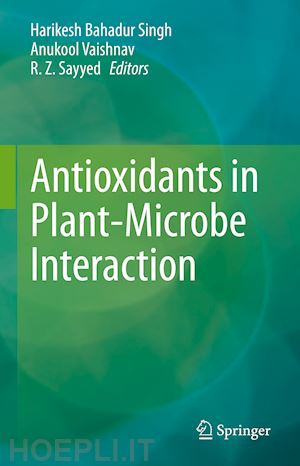
Questo prodotto usufruisce delle SPEDIZIONI GRATIS
selezionando l'opzione Corriere Veloce in fase di ordine.
Pagabile anche con Carta della cultura giovani e del merito, 18App Bonus Cultura e Carta del Docente
This edited book is focused on antioxidant compounds and their biosynthesis, up-regulation, mechanism of action for selective bioactivity, targeted role and the advancement of their bioactive potential during plant-microbe interaction and other stress conditions. This book also emphasizes on the role of antioxidants in recruiting beneficial microbes in plant surroundings. Antioxidants have multiple biological roles in plants especially in the signalling pathway. These compounds are secondary metabolites produced besides the primary biosynthetic pathway and are associated with growth and development. Besides they also have special role to play during oxidative stress produced via abiotic stimulants or pathogen attack. This understanding of the biosynthesis, signaling and function of antioxidant compounds in plants during stress condition is helpful in restoring plant ecosystem productivity and improve plant responses to a wide range of stress conditions. This book is a useful compilation for researchers and academicians in botany, plant physiology, plant biochemistry and stress physiology. Also the book serves as reading material for undergraduate and graduate students of environmental sciences, agricultural sciences and other plant science courses.
Dr. H. B. Singh is Distinguished Professor, Department of Biotechnology, GLA University, Mathura, India. He has served as Professor & Head, Department of Mycology & Plant Pathology, Banaras Hindu University.Also served as Scientist at CSIR-Central Institute of Medicinal & Aromatic Plants, Lucknow and CSIR-National Botanical Research Institute, Lucknow. He has also served the Department of Science & Technology and Department of Biotechnology, Government of India in various project advisory committees. His major focus is on biopesticides and biofertilzers. Prof Singh has received several national awards viz., CSIR Technology Prize, BRSI Industrial Medal, CSIR Award or Science & Technology Innovations for Rural Development, Prof P. Maheshwari Medel, Mundkur Memorial Award, M S Sw^295 research papers, 42 review articles, (with over 8722 citations and h-index 48 as per Google Scholar).He is editor, co-editor and author of 30 books.
Dr. Anukool Vaishnav is working as an Assistant professor in Department of Biotechnology, GLA University, Mathura. He operated SERB-National Postdoctoral Fellowship (NPDF) project as a Principal Investigator at Department of Mycology and Plant Pathology, Institute of Agricultural Sciences, Banaras Hindu University, Varanasi, India. He has 7 years of research experience in Agriculture Microbiology. His research is mainly focuses on microbial mediated plant protection against biotic and abiotic stress, characterization of signaling molecules and secondary metabolites (soluble and VOCs) in plant holobionts. As an active researcher, he has published more than 21 research and review articles along with 15 book chapters for reputed journals and edited books. He has filed 9 Indian patents in association with his research group. He is an editorial member of Current Genomics Journal published by Bentham Science. He has been awarded with Young Scientist Award from reputed societies.
Dr. R. Z. Sayyed is a Professor and Head, Department of Microbiology, PSGVP Mandal’s ASC College, Shahada, (KBC North Maharashtra University, Jalgaon), India. He serves as the President of India Chapter of Asian PGPR Society for Sustainable Agriculture. He is a recipient of the Best Teachers Award, Young Scientist Award, Prof M M Sharma Award, Springer-Society Award, Award for Excellent Contribution-Environmental Sustainability, and Award for Excellence in PGPR Research. He has over 24 years of teaching and research experience in Microbiology. He has authored 132 research papers, 25 book chapters and has edited 18 books. He has delivered many invited talks at several South East Asian and European Countries. He is associated with many International Research Journals in various capacities.











Il sito utilizza cookie ed altri strumenti di tracciamento che raccolgono informazioni dal dispositivo dell’utente. Oltre ai cookie tecnici ed analitici aggregati, strettamente necessari per il funzionamento di questo sito web, previo consenso dell’utente possono essere installati cookie di profilazione e marketing e cookie dei social media. Cliccando su “Accetto tutti i cookie” saranno attivate tutte le categorie di cookie. Per accettare solo deterninate categorie di cookie, cliccare invece su “Impostazioni cookie”. Chiudendo il banner o continuando a navigare saranno installati solo cookie tecnici. Per maggiori dettagli, consultare la Cookie Policy.